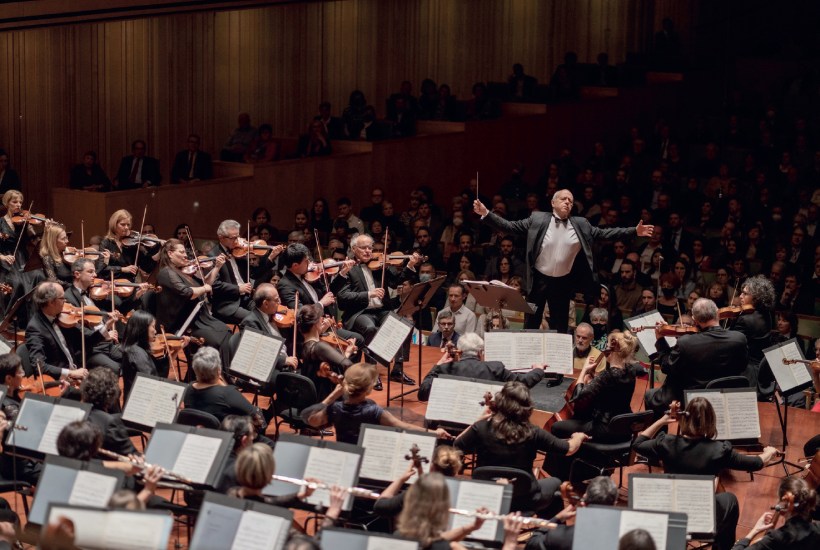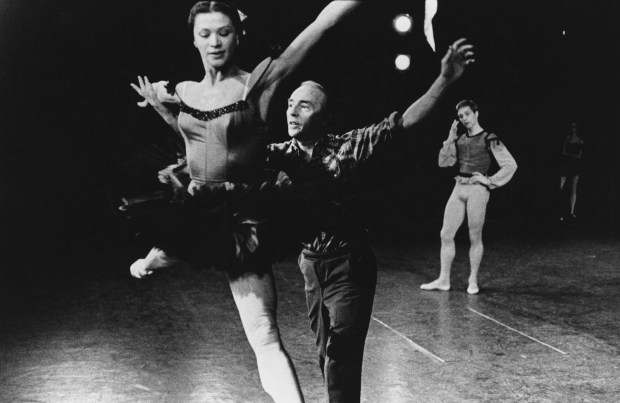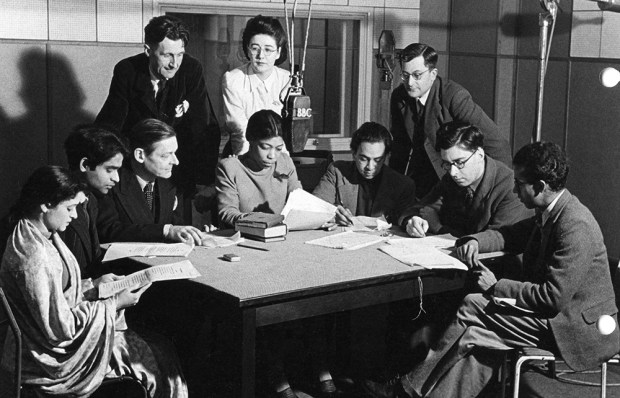In central Budapest a crew from Hungary’s state TV is filming the unveiling of a new street sign. In honour of his centenary year composer Gyorgy Ligeti now has a road named after him. Contemporary classical music is deemed newsworthy in Hungary. Even more astonishingly – and anyone working in British classical music might want to sit down at this point – the ‘Ligeti 100’ concert at the Budapest Music Centre, dedicated to a clutch of bracing new works, was being filmed for transmission prime time on the Hungarian equivalent of BBC1. Here, we’d be lucky if it got a midnight slot on Radio 3.
If much of the West’s cultural output today is marked by an intense sense of embarrassment that it should even exist as art – let alone say anything as art – the Hungarians couldn’t be prouder of their hefty, uncompromising contributions to high culture. This year a small army of them will arrive on these shores to remind us how it’s done.
In four Edinburgh International Festival concerts and three Proms from Ivan Fischer and his always astonishing Budapest Festival Orchestra, in the much-anticipated UK première of Gyorgy Kurtag’s operatic adaptation of Beckett’s Endgame, in a six-date tour from the classy Concerto Budapest under their conductor Andras Keller, in the numerous Ligeti recitals across the country: the high-minded riches of Magyar musical life will be hard to avoid.
If some of their wisdom rubs off, it will not be the first time the Hungarians have come to the rescue of western culture. Think of the experimental engine room of western classicism that was the Esterhazy court under Haydn. Think of Liszt’s dissemination and expansion of romanticism. No Hungarians, no Hollywood. And without the great Hungarian conductors what would American classical music look like?
‘Reiner, Szell, Ormandy, Solti, Dorati: without this Hungarian-Jewish group there would be no orchestral tradition in America,’ conductor Ivan Fischer tells me over Zoom. ‘It’s an amazing achievement.’ They were a spectacularly dictatorial group of maestros it has to be said. They make Lydia Tar (who, remember, pretends to be Hungarian for clout) seem like a softie. ‘It’s only a small side effect that they were dictatorial,’ counters Fischer in his seductive Mitteleuropean drawl. ‘They had to be demanding and you can call it dictatorial. But for them an orchestra was not about job security and a comfortable lifestyle but about taking huge sacrifices. They were great people.’
Few conductors today make as many sacrifices, or take as many risks, as Fischer, but he is no maestro tyrant. ‘You are right: I’m friendly, I’m one of the boys. I’m more this type of family-creator. But… if I would have been in their situation, where they had to create a great orchestra in a country without any tradition, then I would have probably done the same.’
It’s the kind of nuanced, generous, slyly heretical analysis that’s typical of Fischer. Typical also of Fischer’s concerts. The ‘Audience Choice’ night, for example, which comes to the Proms on 13 August, turns every punter into a curator. The anarchy is thrilling: the audience becoming a haggling mob as they try to pin down which of the 285 pieces to choose, the Budapesters flying by the seat of their pants sight-reading through the canon. In between works, while the librarian hunts down the scores (‘it’s the worst day of his year’), expect sung serenades, improvisations, buttock-slapping folk. When I saw them do it at the 2011 Proms, Fischer announced at the start: ‘Don’t expect polish. Things vill go rrrong.’
‘Of course some wind or brass players who have solos are terrified,’ he admits. ‘But I read that when Schubert composed the Great C Major Symphony, the Vienna Phil played it through just to hear it once. Now what was that like? They had a curiosity in the work. So they didn’t care about the polished performance.’
Once you experience things Fischer-style, you realise just how much we are all being short-changed by other orchestras. It’s why – though he has regularly been touted to take over at one of the top ensembles such as the Concertgebouw or the Berlin Phil – he has by and large washed his hands of the whole ‘boring’ system. ‘Let’s imagine I would have taken one of those jobs. Then I sell my soul. I give up all my principles and pleasure of what I’m doing,’ he says. ‘We achieve things with the Budapest Festival Orchestra which are far, far better, more advanced than any of the so-called ‘famous’, old-fashioned snob orchestras. So why should I go there? For what? For glamour? Money? Career? These things are not so attractive.’
In mindset, language, culture, Hungarians have always cultivated a sensibility of being a world apart. The Hungarian scientists who emigrated to America in the early 20th century – and pioneered nuclear chain reactions among other things – even named themselves ‘the Martians’. It’s perhaps no surprise then that when Stanley Kubrick sought a way to soundtrack space, he turned to Ligeti, chief conjuror of the uncanny.
It was Ligeti who urged Kurtag – who was living in Paris in the 1950s – to catch a ‘genius’ new play called Waiting for Godot. Kurtag couldn’t get a ticket so he made sure he saw Beckett’s next, Endgame. ‘I understood almost nothing but I bought the text immediately,’ the nonagenarian Kurtag tells me, his wheelchair illuminated by a dazzling block of sunlight in the wood-lined loft of the beautiful Music Centre. ‘Since then all that Beckett wrote was like a Bible for me.’ He never plucked up the courage to talk to Beckett: ‘I didn’t want to meet him because I felt that I’m not enough intelligent to have questions for him.’
Humbleness and anxiety (‘I do what I can but what I do is very little,’ he insists) coexist in Kurtag alongside a notorious exacting quality. There’s a frankly hilarious YouTube video of him endlessly rehearsing a few notes of his opera of Endgame with the astonishing contralto Hilary Summers that culminates in an exhausted cry from the composer: ‘The problem is you’re singing what is written!’ Of course within seconds of me opening my mouth, he is – extremely gently – attacking my articulation: ‘A little bit slower, louder and clearer.’
Perversity is Kurtag’s signature: in his music as much as his life. In Paris, he had a nervous breakdown, entered psychoanalysis, maintained a strict rice diet (half made with stock, half sweet), lost 20kg, and tried to change every element of his personality. ‘I even wanted to have geometric handwriting. It was full of mad things like this… But little by little I came to accept myself.’ When he returned to Hungary he began his opus 1.
Now, at the age of 97, Kurtag is considered the last of the great modernists. In his compositions ‘every detail is reduced to its maximum’, as someone wrote about Beckett. You can stream his entire output of 60-odd works back to back in just over half a day. He once conceived of writing a minute-long symphony so dense, everything superimposed, that you wouldn’t be able to hear a single note. His music, when it’s not mugging you in the pitch black, stutters into space in glinting, broken fragments. Melodies are always cut short. It’s as if the struggle to create is being expressed by the notes themselves. Why does he compose like this? ‘I don’t know,’ he says, grabbing a pen, stabbing my notebook and shaking his hand until he has perforated about a dozen pages and drawn what looks like a squashed fly.
If Ligeti was a master of a blazing kind of day-music, Kurtag is a master of the encroaching night, I suggest. ‘I like this supposition,’ he says, but Ligeti was also a master of the dark, he insists. I ask why so much of his music is funerary? He smiles. ‘If someone is dying that’s inspiring me to composition.’
Endgame is his first opera and lasts just two hours but the prosody alone took two years to work out, and the rehearsals (normally a few weeks long) took another two years. When’s he starting his next? He bangs his finger on the table. He already has: ‘I have a very good libretto.’ Naturally, it’s about the love life of the 18th-century physicist Georg Christoph Lichtenberg.
There’s a confidence to Budapest right now. A swagger to its elegant streets and the thronged banks of the Danube. In fact, if you consider the globally revered status of an author such as Laszlo Krasznahorkai and filmmaker Bela Tarr, it feels as though Hungarian culture is living through a golden age. The question then arises: why? Whisper it but could Viktor Orban have something to do with it? ‘Art is very important for the government,’ says Concerto Budapest’s director Andras Keller. ‘And [Orban’s] support for culture is not political. It is only that he likes the country… and we have fantastic art.’
Even Fischer, who is no fan of the government, admits that ‘probably yes, Orban has been good for culture’. Everyone agrees it is still all underfinanced. But Orban has increased funds, says Keller, and introduced a policy where a percentage of VAT must go to culture. ‘[The arts get] 1.2-1.4 per cent of GDP which is more than the EU’s average,’ adds Keller. It’s also a staggering 56 times higher, percentage-wise, than the Arts Council England budget.
When I tell Keller that many people in the West believe that Orban’s Hungary is fascist, he looks at me with a mixture of outrage and distress: ‘This is not true. I must refuse this sentence. You arrived yesterday. What was your impression? I advise everyone who is saying this please to come here and look around you… I’m not saying that everything is perfect here in politics. But the people are absolutely free to say what they want.’
Neither of them really wants to talk politics. Keller above all wants to talk about love. He explains how he thinks the new work by Kurtag for the Ligeti centenary concert was a love letter. ‘The love of music. Our nation. The love of their brotherhood. The love of Ligeti.’
Yes, there’s strong state support, there’s talent, there’s the Martian mindset, but listening to the softly spoken Keller, I realise that possibly the real reason things are flourishing in Hungary is that they have retained a profound affection for the intrinsic necessity and beauty of art-making that I’m not sure any artist today in the West would have the guts to express. ‘Musical notes are for us living,’ he says. ‘They’re a living organism. And we have a responsibility for these notes. For me and the musicians our responsibility is to give a good life to these notes. Even the very short, fast notes. “This is your job,” I say. “To give a good life for this little 16th note.” I believe this very deeply. The music is everything.’
Got something to add? Join the discussion and comment below.
Get 10 issues for just $10
Subscribe to The Spectator Australia today for the next 10 magazine issues, plus full online access, for just $10.
You might disagree with half of it, but you’ll enjoy reading all of it. Try your first month for free, then just $2 a week for the remainder of your first year.















Comments
Don't miss out
Join the conversation with other Spectator Australia readers. Subscribe to leave a comment.
SUBSCRIBEAlready a subscriber? Log in